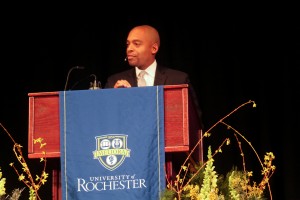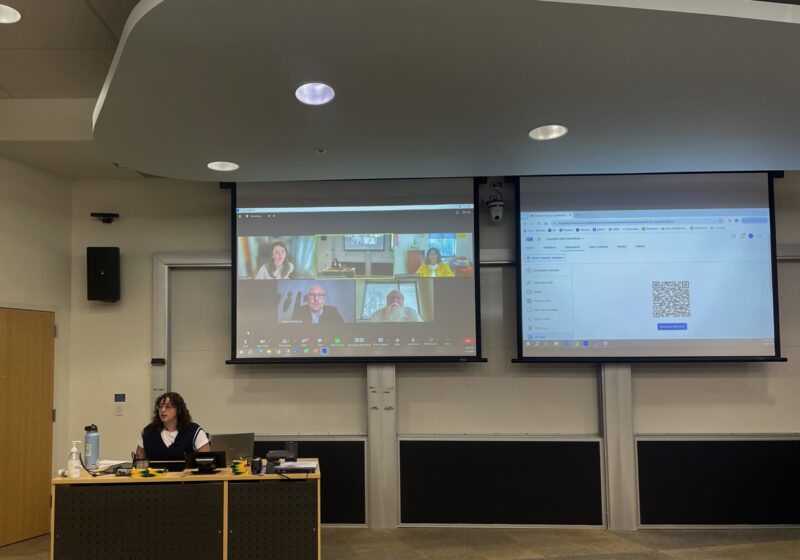“Never has this event been more timely,” UR President Joel Seligman said in his opening remarks at the 14th annual Martin Luther King, Jr. Commemorative Address.
The address, delivered by author and historian Khalil Gibran Muhammad, was titled “The Conventional Legacy of An Unconventional Man:
King’s Leadership in the Age of Ferguson.” It focused on the need to “relearn our history,” allowing reflection to shape contemporary and future decisions on race and advocacy. Muhammad is the Director of the Schomburg Center for Research in Black Culture in New York, N.Y.
In his recent book, “The Condemnation of Blackness: Race, Crime, and the Making of Modern Urban America,” Muhammad seeks to do exactly that. The book explores the history and origins of black criminality and the ways in which it has resulted in current prejudices and injustices.
Because of his young age, prominent role at the Schomberg Center and the acclaim of his recent publication, student leaders and faculty on the speaker selection committee thought Muhammad would prove a promising speaker.
“He was somebody that the students could relate to,” Senior Counselor and Academic Program Coordinator at the Office of Minority Student Affairs, Thomas Crews, said.
Crews also noted an increasing tendency among students to prefer speakers who were not necessarily involved in the Civil Rights Movement, but rather the current “evolution of the movement.”
“I thought he would be a very timely speaker,” junior Sequoia Kemp, a member of the Minority Student Advisory Board and e-board member of the Black Students Union, said. “His role as a historian really stood out to me because I never really learned about the history of blacks and whites in the United States other than about their [relationship in] the civil rights movement. I was interested to hear what he had to say.”
Kemp said her expectations were met at Muhammad’s talk.
“My favorite part about the talk was when he shared about his own experiences and his experience having black children in America,” she said. “It showed his really intimate relationship with his kids and how he educates them.”
This education is an important component of Muhammad’s philosophy. At a question-and- answer session at Douglass Leadership House prior to the talk, he spoke to the value of understanding history in a new way. “He said that history is valuable and that […] being able to acknowledge the patterns is important,” Kemp said. “The Schomberg Center is a safe haven for people to learn about their ancestry as a way to combat today’s issues.”
Crews took a different lesson away from Muhammad’s address. In commemoration of Martin Luther King, Jr., Muhammad spent time discussing King’s leadership, even reading a quote from a letter King had written to his wife, Coretta Scott King.
“[Muhammad] mentioned that Dr. King himself was not a conventional leader,” Crews said. “I think that was telling because it opens leadership up to more people. You don’t have to be pigeon-holed by a particular style of leadership, [and] that everyone can lead in some way. That’s what I really took away.”
Remus is a member of
the class of 2016.






